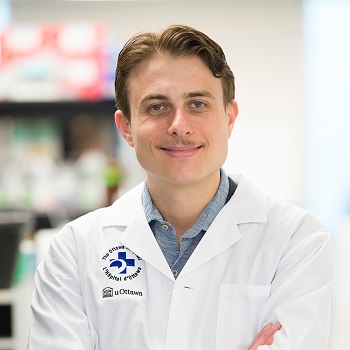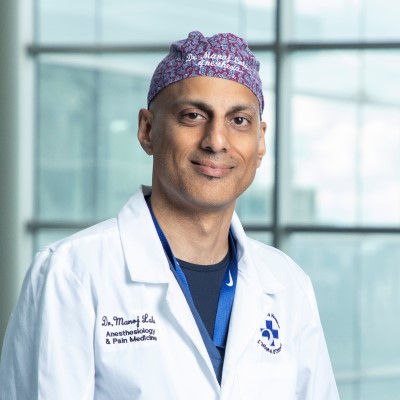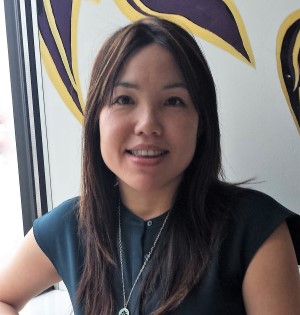 ELEVATE seed grants were awarded to (clockwise from top left): Drs.Manoj Lalu, Michele Ardolino, Shirley Mei and Johné Liu.
ELEVATE seed grants were awarded to (clockwise from top left): Drs.Manoj Lalu, Michele Ardolino, Shirley Mei and Johné Liu.
The Ottawa Hospital’s Research Institute is awarding four ELEVATE seed grants to help researchers understand the role of inflammation and the immune system in various diseases and develop better treatments.
The grants, worth a total of $200,000, will advance research on conditions that affect the ovaries, lungs, colon and immune system. They were selected after a rigorous review by a panel of internal and external researchers as well as patient partners.
ELEVATE is funded in part through undesignated gifts to The Ottawa Hospital’s Research Institute through The Ottawa Hospital Foundation.
The ELEVATE competition focuses on a different strategic theme each year. The 2022 theme was early-career researchers, while in 2023 there were two themes: inflammation and the immune system and kidney research.
“Through our strategic planning process, we identified the need for a seed funding program to kickstart innovative projects and help researchers generate preliminary data for larger external grant applications,” said Dr. Duncan Stewart, Executive Vice-President of Research at The Ottawa Hospital and professor of medicine at the University of Ottawa. “We look forward to seeing the impact of these projects and funding further competitions in the future.”
Research project lay summaries:
What’s the immune system’s role in polycystic ovarian syndrome?
 Dr. Michele ArdolinoPolycystic ovarian syndrome (PCOS) is a condition where the ovaries produce too many androgen hormones. It’s a leading cause of infertility that affects 8-13% of people with ovaries. The underlying cause is unknown. We hypothesize that immune cells in the ovaries called Type 2 innate lymphoid cells (ILC2s) contribute to this disorder by responding to androgens and causing inflammation. We recently showed that ILC2s are found in mouse ovaries and cause significant inflammation in response to androgens. To test our hypothesis, we will examine the ILC2s in ovaries of people with and without PCOS. Then we will use mouse models of PCOS to study the mechanism of how ILC2s are being activated by androgens. We hope to determine the role of ILC2s in this disorder and find out whether reducing their number can improve symptoms of PCOS.
Dr. Michele ArdolinoPolycystic ovarian syndrome (PCOS) is a condition where the ovaries produce too many androgen hormones. It’s a leading cause of infertility that affects 8-13% of people with ovaries. The underlying cause is unknown. We hypothesize that immune cells in the ovaries called Type 2 innate lymphoid cells (ILC2s) contribute to this disorder by responding to androgens and causing inflammation. We recently showed that ILC2s are found in mouse ovaries and cause significant inflammation in response to androgens. To test our hypothesis, we will examine the ILC2s in ovaries of people with and without PCOS. Then we will use mouse models of PCOS to study the mechanism of how ILC2s are being activated by androgens. We hope to determine the role of ILC2s in this disorder and find out whether reducing their number can improve symptoms of PCOS.
Research team: Michele Ardolino (pictured), Barbara Vanderhyden, Eve Tsai, Sara Asif, Katarina Kovacina
Quelling the inflammatory tide: CAR-T regulatory therapy for acute respiratory distress syndrome
 Dr. Manoj LaluAcute respiratory distress syndrome (ARDS) is a life-threatening lung injury that happens when the immune system overreacts to an infection or major injury. Treatment options are limited, and many people with ARDS die from it. We propose a project that will produce a novel cell therapy for ARDS. Our innovative approach will use regulatory T cells (Treg), which are immune cells that reduce inflammation. Their function can be further enhanced by the expression of chimeric antigen receptors (CARs). Researchers at The Ottawa Hospital already have expertise in making CARs for the treatment of cancer. We propose to leverage this expertise to produce and test a newer class of CAR-T cells: CAR-T regulatory cells (CAR-Tregs). To develop this novel therapy, we will isolate and expand Tregs, generate CAR-Tregs with biosensors that optimize their targeting to inflammation, and evaluate the therapy’s anti-inflammatory effects in two well-established mouse models of acute lung injury. This will initiate a new line of research with significant translational potential.
Dr. Manoj LaluAcute respiratory distress syndrome (ARDS) is a life-threatening lung injury that happens when the immune system overreacts to an infection or major injury. Treatment options are limited, and many people with ARDS die from it. We propose a project that will produce a novel cell therapy for ARDS. Our innovative approach will use regulatory T cells (Treg), which are immune cells that reduce inflammation. Their function can be further enhanced by the expression of chimeric antigen receptors (CARs). Researchers at The Ottawa Hospital already have expertise in making CARs for the treatment of cancer. We propose to leverage this expertise to produce and test a newer class of CAR-T cells: CAR-T regulatory cells (CAR-Tregs). To develop this novel therapy, we will isolate and expand Tregs, generate CAR-Tregs with biosensors that optimize their targeting to inflammation, and evaluate the therapy’s anti-inflammatory effects in two well-established mouse models of acute lung injury. This will initiate a new line of research with significant translational potential.
Research team: Manoj Lalu (pictured) Natasha Kekre, John Bell, Jennifer Quizi, Forough Jahandideh, Blueprint Translational Research Group
Could an engineered yeast help treat ulcerative colitis?
 Dr. Johné LiuCurrent treatments for the inflammatory bowel disease ulcerative colitis (UC) do not always work, and relapses are frequent. Some clinical trials have shown that combining the commonly used anti-inflammatory drug for UC called Mesalazine with the probiotic yeast Saccharomyces boulardii (Sb) could be a more effective treatment. Our team has genetically engineered Sb yeast to overproduce a potent anti-inflammatory and immune-enhancing molecule. We have found our engineered yeast strain Sb576 to be significantly better at treating the symptoms of UC in mice compared to typical Sb. Our next step is to validate this promising new treatment in the lab, paving the way for future clinical trials. We will compare how effective Sb576 is alone and combined with Mesalazin for treating UC in mice. We will analyze the gene expression of the cells lining the colon in healthy mice, untreated mice with UC, and UC mice after the various treatments, and compare them to publicly available gene expression databases of mice and humans with UC. We will confirm any gene expression patterns we find using biopsy samples from The Ottawa Hospital’s IBD clinic.
Dr. Johné LiuCurrent treatments for the inflammatory bowel disease ulcerative colitis (UC) do not always work, and relapses are frequent. Some clinical trials have shown that combining the commonly used anti-inflammatory drug for UC called Mesalazine with the probiotic yeast Saccharomyces boulardii (Sb) could be a more effective treatment. Our team has genetically engineered Sb yeast to overproduce a potent anti-inflammatory and immune-enhancing molecule. We have found our engineered yeast strain Sb576 to be significantly better at treating the symptoms of UC in mice compared to typical Sb. Our next step is to validate this promising new treatment in the lab, paving the way for future clinical trials. We will compare how effective Sb576 is alone and combined with Mesalazin for treating UC in mice. We will analyze the gene expression of the cells lining the colon in healthy mice, untreated mice with UC, and UC mice after the various treatments, and compare them to publicly available gene expression databases of mice and humans with UC. We will confirm any gene expression patterns we find using biopsy samples from The Ottawa Hospital’s IBD clinic.
Research team: Johné Liu (pictured), Mike Tyers, Sanjay Murthy, Terence Moyana, and David Landry
Could female stem cells be better at fighting sepsis?
 Dr. Shirley MeiSepsis is a deadly condition where an infection spreads through the body and over-activates the immune system, causing many organs to fail. Work by our lab showed mesenchymal stem cells (MSCs) dampen the damaging part of the immune response while bolstering the more beneficial parts. Following encouraging preclinical results, our team has since developed several clinical- and scale-up- ready MSC products that were manufactured and translated to Health Canada-regulated clinical trials as potential treatments for sepsis. There is increasing evidence that biological sex may play an important role in how the body fights sepsis, with females having better outcomes likely due to a stronger immune response. Preliminary experiments done by our lab using cells in a dish suggest that female MSCs may be more potent than male MSCs when it comes to fighting sepsis. Our team proposes to complete a biobank of multiple female and male donor MSCs, to characterize their properties, and to understand how they may differ in their respective effects on immune cells from sepsis patients of both sexes. This information will be leveraged to inform future trial designs and potentially improve outcomes.
Dr. Shirley MeiSepsis is a deadly condition where an infection spreads through the body and over-activates the immune system, causing many organs to fail. Work by our lab showed mesenchymal stem cells (MSCs) dampen the damaging part of the immune response while bolstering the more beneficial parts. Following encouraging preclinical results, our team has since developed several clinical- and scale-up- ready MSC products that were manufactured and translated to Health Canada-regulated clinical trials as potential treatments for sepsis. There is increasing evidence that biological sex may play an important role in how the body fights sepsis, with females having better outcomes likely due to a stronger immune response. Preliminary experiments done by our lab using cells in a dish suggest that female MSCs may be more potent than male MSCs when it comes to fighting sepsis. Our team proposes to complete a biobank of multiple female and male donor MSCs, to characterize their properties, and to understand how they may differ in their respective effects on immune cells from sepsis patients of both sexes. This information will be leveraged to inform future trial designs and potentially improve outcomes.
Research team Lead: Shirley Mei (pictured); Team: Yuan Tan, Mahmoud Salkhordeh, Aidan Murray, Chi Wang, Maria Florian, Yan Wang, and Pramod Sahadevan; Collaborators: Duncan Stewart, Damian Carragher (OHRI mass cytometry core facility), Irene Watpool.
The Ottawa Hospital is a leading academic health, research and learning hospital proudly affiliated with the University of Ottawa and supported by The Ottawa Hospital Foundation.
